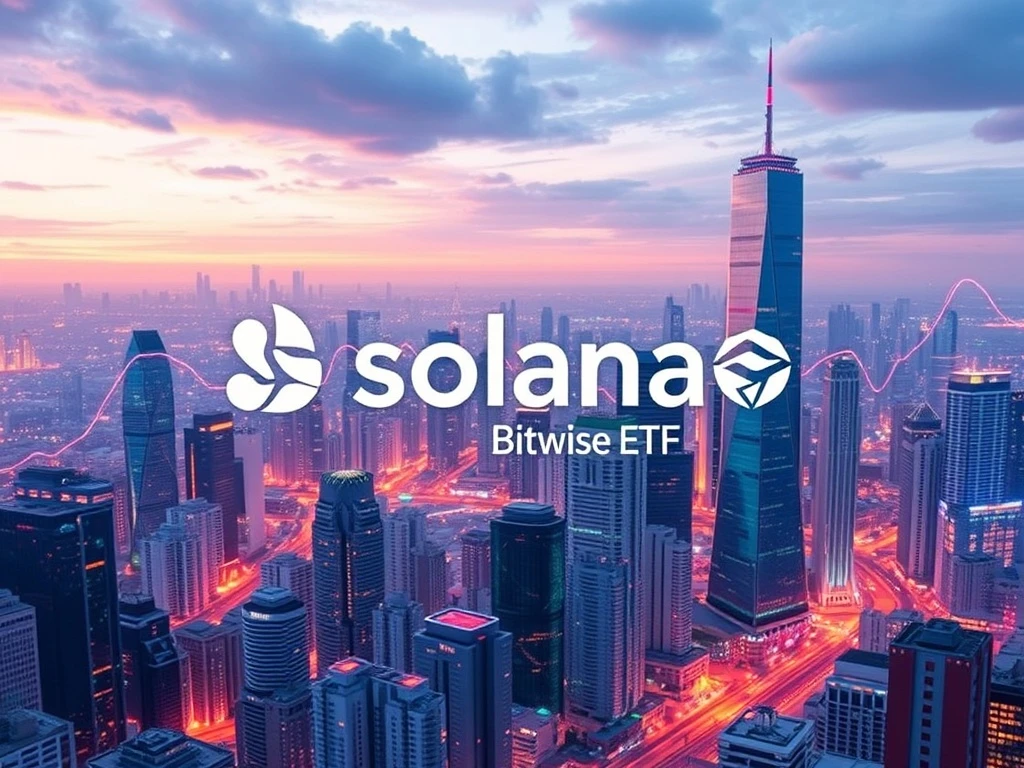Momentous Solana ETF Debut: Bitwise Fund Attracts $223M, Signals Strong Institutional Demand

The cryptocurrency market recently witnessed a significant milestone. The Bitwise Solana Staking ETF (BSOL) made its debut, attracting substantial investment. This launch signals a growing appetite among institutional investors for crypto-backed financial products. Many market observers now watch this development closely.
Bitwise Solana ETF Launch Exceeds Expectations
The Bitwise Solana Staking ETF (BSOL) officially began trading on Tuesday. It quickly garnered significant attention. The fund attracted approximately $222.8 million in assets on its first day. This impressive figure comes from Bloomberg Intelligence senior ETF analyst Eric Balchunas. He described the initial haul as remarkable for a new crypto ETF. This indicates robust interest and confidence from major financial players. The **Bitwise Solana** product clearly resonated with the market.
Bitwise previously launched a similar Solana staking exchange-traded product in Europe. However, the US version faced delays. Regulatory uncertainties surrounding crypto staking activities caused these hold-ups. Now, BSOL stands as the first US **Solana ETF**. It offers investors direct exposure to Solana (SOL). Furthermore, it provides an estimated 7% yield. This yield derives from staking rewards on the Solana network.
Driving Factors: Crypto Staking and Regulatory Clarity
Investor appetite for staking-focused exchange-traded funds in the United States appears strong. The success of BSOL highlights this trend. Notably, the REX-Osprey Solana Staking ETF (SSK) launched earlier. It debuted on June 30, seeing around $12 million in first-day trading volume. These launches follow crucial regulatory developments.
The US Securities and Exchange Commission’s Division of Corporation Finance issued a staff statement on May 29. This statement clarified that certain proof-of-stake (PoS) activities do not constitute securities offerings under federal law. A follow-up statement in August expanded these conditions. It included certain liquid **crypto staking** activities. This newfound **SEC clarity** has paved the way for such innovative financial products. It reduces regulatory risks for issuers and investors alike. Therefore, more institutions now consider these opportunities.
Surging Institutional Demand for Altcoin ETFs
The debut of BSOL confirms a broader market trend. **Institutional demand** for crypto ETFs remains robust. This trend follows the blockbuster launch of US spot Bitcoin (BTC) ETFs in early 2024. Subsequently, Ether (ETH) ETFs also saw substantial inflows, albeit at a slower pace initially. Analysts now suggest attention is shifting toward alternative crypto assets. These altcoins offer diverse investment opportunities.
JPMorgan made a significant projection in January. The bank estimated that upcoming Solana and XRP (XRP) ETFs could attract billions of dollars. They predicted these inflows within their first six months of trading. This could potentially even outpace Ether’s early performance. JPMorgan’s forecast was based on comparable adoption rates of Bitcoin and Ether funds. They estimated $3 billion to $6 billion in inflows for SOL funds. For XRP products, they projected $4 billion to $8 billion. This indicates a growing institutional confidence in a wider range of digital assets beyond just Bitcoin and Ethereum.

Future Outlook for Crypto ETFs
The strong performance of the Bitwise Solana Staking ETF marks a pivotal moment. It signals increasing institutional acceptance of altcoin-focused investment vehicles. The combination of clear regulatory guidance and attractive staking yields drives this interest. Consequently, the crypto market anticipates further innovation in this space. Investors will likely see more diverse ETF offerings. These products will provide new avenues for exposure to digital assets. This evolution benefits both traditional finance and the crypto ecosystem.








